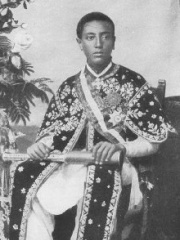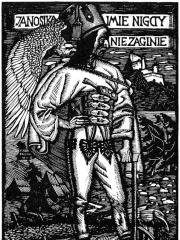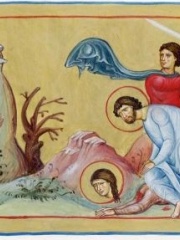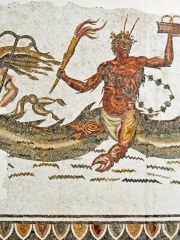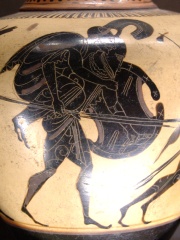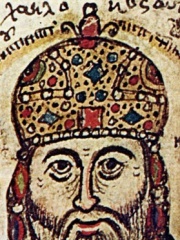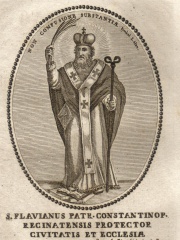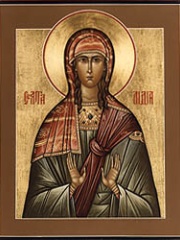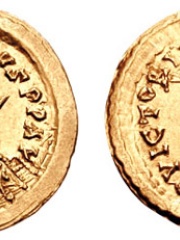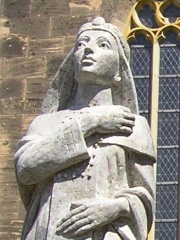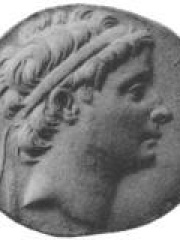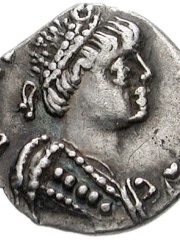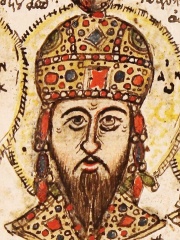POLITICIAN
Dardanus

 Dardanus
Dardanus
In Greek mythology, Dardanus (; Ancient Greek: Δάρδανος, Dardanos) was the founder of the city of Dardanus at the foot of Mount Ida in the Troad. Dardanus, a son of Zeus and the Pleiad Electra, was a significant figure in Greek mythology. He was the brother of Iasion and sometimes of Harmonia and Emathion. Originally from Arcadia, Dardanus married Chryse, with whom he fathered two sons, Idaeus and Deimas. Read more on Wikipedia
His biography is available in 33 different languages on Wikipedia. Dardanus is the 2,343rd most popular politician (up from 4,182nd in 2024), the 274th most popular biography from Türkiye (up from 423rd in 2019) and the 150th most popular Turkish Politician.
Memorability Metrics
Page views of Dardanus by language
Among POLITICIANS
Among politicians, Dardanus ranks 2,343 out of 19,576. Before him are Manasseh, Kitbuqa, Gaston Doumergue, William II of Holland, Peter Carington, 6th Baron Carrington, and Andrew Mellon. After him are Abd al-Rahman II, Lij Iyasu of Ethiopia, Frederick Henry, Prince of Orange, Uesugi Kenshin, Alaric II, and Juraj Jánošík.
Most Popular Politicians in Wikipedia
Go to all RankingsManasseh
709 BC - Present
HPI: 71.30
Rank: 2,338
Kitbuqa
1250 - 1260
HPI: 71.30
Rank: 2,339
Gaston Doumergue
1863 - 1937
HPI: 71.29
Rank: 2,340
William II of Holland
1228 - 1256
HPI: 71.29
Rank: 2,341
Peter Carington, 6th Baron Carrington
1919 - 2018
HPI: 71.29
Rank: 2,342
Andrew Mellon
1855 - 1937
HPI: 71.29
Rank: 2,343
Dardanus
HPI: 71.28
Rank: 2,344
Abd al-Rahman II
788 - 852
HPI: 71.27
Rank: 2,345
Lij Iyasu of Ethiopia
1895 - 1935
HPI: 71.27
Rank: 2,346
Frederick Henry, Prince of Orange
1584 - 1647
HPI: 71.27
Rank: 2,347
Uesugi Kenshin
1530 - 1578
HPI: 71.27
Rank: 2,348
Alaric II
458 - 507
HPI: 71.26
Rank: 2,349
Juraj Jánošík
1688 - 1713
HPI: 71.26
Rank: 2,350
In Türkiye
Among people born in Türkiye, Dardanus ranks 274 out of 1,347. Before him are Adnan Menderes (1899), Philemon (100), Niketas Choniates (1155), Phorcys (null), André Chénier (1762), and Anchises (null). After him are Priscus (410), Aratus (-315), Michael IX Palaiologos (1277), Flavian of Constantinople (380), Lydia of Thyatira (100), and Tansu Çiller (1946).
Others born in Türkiye
Go to all RankingsAdnan Menderes
POLITICIAN
1899 - 1961
HPI: 71.51
Rank: 268
Philemon
RELIGIOUS FIGURE
100 - 68
HPI: 71.46
Rank: 269
Niketas Choniates
HISTORIAN
1155 - 1217
HPI: 71.45
Rank: 270
Phorcys
POLITICIAN
HPI: 71.45
Rank: 271
André Chénier
WRITER
1762 - 1794
HPI: 71.30
Rank: 272
Anchises
POLITICIAN
HPI: 71.30
Rank: 273
Dardanus
POLITICIAN
HPI: 71.28
Rank: 274
Priscus
PHILOSOPHER
410 - 471
HPI: 71.23
Rank: 275
Aratus
WRITER
315 BC - 240 BC
HPI: 71.21
Rank: 276
Michael IX Palaiologos
POLITICIAN
1277 - 1320
HPI: 71.14
Rank: 277
Flavian of Constantinople
RELIGIOUS FIGURE
380 - 449
HPI: 71.12
Rank: 278
Lydia of Thyatira
RELIGIOUS FIGURE
100 - 100
HPI: 71.10
Rank: 279
Tansu Çiller
ECONOMIST
1946 - Present
HPI: 71.07
Rank: 280
Among POLITICIANS In Türkiye
Among politicians born in Türkiye, Dardanus ranks 150. Before him are Basiliscus (500), Fahri Korutürk (1903), Theophanu (960), Adnan Menderes (1899), Phorcys (null), and Anchises (null). After him are Michael IX Palaiologos (1277), Seleucus II Callinicus (-265), Vitiges (475), Celâl Bayar (1883), Kemal Kılıçdaroğlu (1948), and John VII Palaiologos (1370).
Basiliscus
500 - 476
HPI: 71.65
Rank: 144
Fahri Korutürk
1903 - 1987
HPI: 71.58
Rank: 145
Theophanu
960 - 990
HPI: 71.58
Rank: 146
Adnan Menderes
1899 - 1961
HPI: 71.51
Rank: 147
Phorcys
HPI: 71.45
Rank: 148
Anchises
HPI: 71.30
Rank: 149
Dardanus
HPI: 71.28
Rank: 150
Michael IX Palaiologos
1277 - 1320
HPI: 71.14
Rank: 151
Seleucus II Callinicus
265 BC - 225 BC
HPI: 71.03
Rank: 152
Vitiges
475 - 542
HPI: 70.97
Rank: 153
Celâl Bayar
1883 - 1986
HPI: 70.92
Rank: 154
Kemal Kılıçdaroğlu
1948 - Present
HPI: 70.77
Rank: 155
John VII Palaiologos
1370 - 1408
HPI: 70.77
Rank: 156







